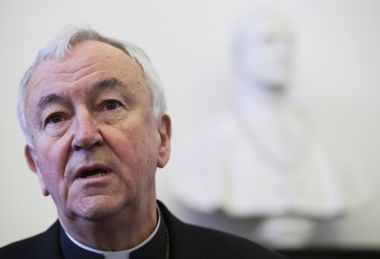Vincent Nichols: Catholic Church 'doesn't pay anyone less than living wage'

The leaders of the 4.2 million Catholics in England and Wales has insisted that the Catholic Church does not itself employ anyone earning less than the living wage.
The Bishops have released a letter addressed to Catholics across England and Wales urging them to challenge candidates on where they stand on assisted suicide, abortion, marriage, Europe, the living wage and asylum and immigration before they vote in this year's General Election.
The Catholic election document, just four pages long, came days after the Church of England was forced to defend itself against accusations of left-wing bias when it published its own 52-page letter warning that people feel detached from politics and calling for a "fresh moral vision of the kind of country we want to be."
The Archbishop of Canterbury Justin Welby was then forced into an embarrassing admission when The Sun newspaper disclosed that the Church pays some staff less than the living wage of £7.85 an hour outside London.
Archbishop Welby said the situation, at his own cathedral, was "something we don't like" and said Canterbury was moving "aggressively" towards paying the living wage as soon as possible. Ironically the Living Wage Commission is headed by his colleague in the north, Archbishop of York Dr John Sentamu.
Archbishop of Westminster Vincent Nichols said Catholic bishops were also supporting the living wage. He told a press conference in London that two years ago Catholic bishops of England and Wales agreed that in accordance with Catholic teaching, they supported the living wage.
"This organisation the bishops' conference certainly pays the living wage to all its employees," he told a press conference. Everyone on the payroll of the Archdiocese of Westminster and the Church in London was paid the living wage.
And while he could not guarantee that everyone who supplied services to church organisations, such as 300 schools in Westminster, paid their staff a living wage, this was also being "pursued".
He also disagreed with Russell Brand, the comedian and actor, who has questioned the point of voting. The Cardinal said voting was part of being a "good citizen". He added: "Stir yourself." The level debate was often more about playing the man than playing the ball. "But we have to do it. We have these ten weeks in which to try and raise the game and try and make sure that some of these debates do address the crucial issues."
In their letter, the Catholic bishops describe the gospel as "radical and challenging".
They say: "At this General Election we are asked to think about the kind of society we want here at home and abroad. Whom you vote for is a matter for you alone."
They do not advise voting for a particular party.
"Voting in a general election should seldom, if ever, be based on a single issue. Elections involve a whole range of issues, some without doubt more central than others, particularly those concerned with the dignity and value of human life and human flourishing."
A bill to legalise assisted suicide is currently being considered in the Lords that would allow terminally-ill patients to be prescribed a lethal drug if two doctors approve.











